Civilization V: Gods & Kings Review
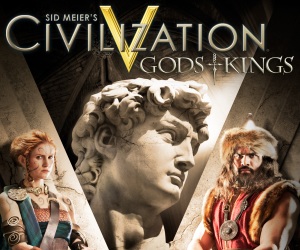 Game: Civilization V: Gods & Kings
Game: Civilization V: Gods & Kings
Developer: Firaxis
Publisher: 2K Games
Available on: PC Only
If there was ever a strategy dynasty that has stood the test of time, it’s Sid Meier’s Civilization series. Spanning five main versions, and countless expansions, the Civilization games have been a mainstay of 4X-loving gamers’ PCs for years. With the success of the newest version, Civilization V, in 2010, there was some controversy over whether the game was more about warmongering than the intricate balance of all the different techniques of ruling a civilization that we’d seen in previous games.
Civilization V: Gods & Kings aims to cater to both the warmonger and the peace-keeper, with various additions and re-additions to the series in order to make the overall Civilization V experience the best it can possibly be. However, does it do enough to win back those who prefer the older games, or does it simply alienate them further?
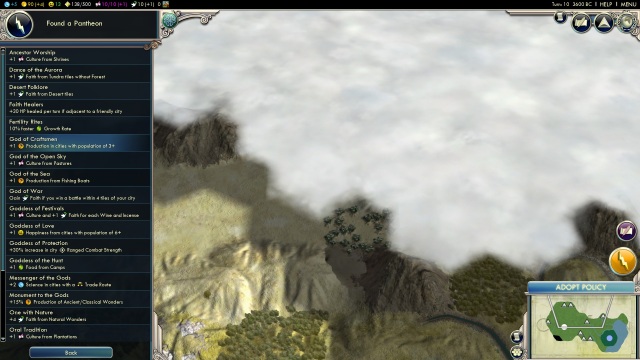
Upon loading up the expansion, and starting a game, the first thing you’ll notice is the abundance of new leaders and civilizations. There are nine additional leaders and civilizations, Boudicca (Celts), William I (Netherlands), Pacal the Great (Maya), Dido (Carthage), Theodora (Byazantium), Atilla (Hun), Haile Selassie (Ethiopia), Marie Theresa (Austria) and Gustavus Adolphus (Sweden). With them, they bring the ability to unlock new technologies, units and buildings, related to them. For example, Boudicca, the ancient queen of the Iceni tribe and the leader of the Celtica civilization, brings with her a unique Pictish Warrior unit, and a variation of the Opera House called a Ceilidh Hall.
The new leaders, particularly Boudicca and Theodora, also boast a number of traits that tie in nicely to the re-introduction of one of the most requested features; religion. As each civilization earns ‘faith’, you can found a Pantheon (an early age stepping-stone to Religion that provides boosts to your civilization in various ways), spawn Great Prophets and eventually found a religion. Once you’ve founded a religion, you can buy Great Prophets, Inquisitors and build religious buildings purchased with faith. Cities accumulate faith, and this varies depending on your civilization, for example, the Celts gain more faith through Boudicca, the more forests there are near a city, the more faith you build up. Whilst the boosts a religion of your own (like Pagan Taoism that I founded with Boudicca) provide are a great boost to your civilization in the early game, the effects soon begin to taper out once you hit the Renaissance era.
That’s not to say you lose out on ways to boost your technology and give your civilization the edge. With the re-introduction of Espionage entering into play, you gain access to spies, but with some changes from previous games. Rather than being trained, at certain points along the time-line, your civilization will gain spies. Spies can then be used to do everything from rigging city-state elections to gain influence, steal technologies, spy on leaders and find out plans on who is going to attack whom. As they level up, via successful theft of technology, they become more efficient at their job. Unfortunately, due to the ability to find out who is going to attack whom, Espionage mechanics are unavailable in Multiplayer. The changes in diplomacy seen in Gods & Kings are also handy for espionage, with the ability to place embassies into capitals to see what and where civilizations are developing, and no diplomatic penalty for aiming for the same victory goal. All in all, the intricacies of becoming ‘top dog’ in your world have changed for the better, and the two additions (though limited in scope) are welcomed.
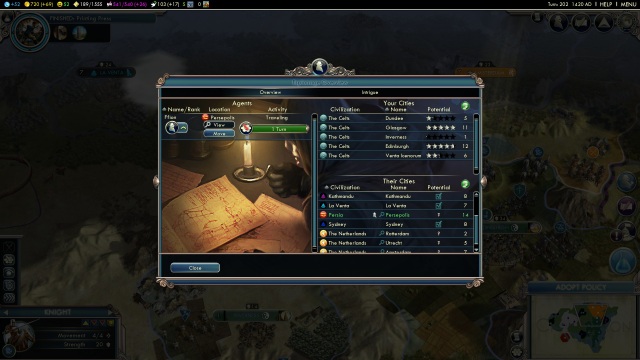
If you were one of those players who enjoyed a diplomatic victory through currying the favour of the various city-states that are dotted around, you’ll be pleased to know that added levels of complexity have been introduced in Gods & Kings as well. City-states now feature ‘quests’ for the player to fulfil in order to gain influence. This can range from removing barbarian encampments near to the settlements to attacking other civilizations that are hassling them. With races to gain the most technology, culture or faith in a set time-frame, and new bonuses from influencing city-states, there is a whole new aspect to the game that was missing from the original game. If you ally with certain cities, you’ll get access to resources and faith boosts (from the new Mercantile and Religious city-states), rather than having purely gold be the key factor in your influence over city-states.
If you prefer to take an autocratic military approach to proceedings, then Gods & Kings too has some new additions for you. Changes to the combat system have been made in order to stop attacks failing, with the emphasis removed from the luck of the dice. Instead, a more balanced army composition, with a greater line of attack available, makes all the difference in battle. In addition to changes on land, the battle at sea has been altered too, as well as the addition of Great Admirals, who can instantly repair every naval or embarked unit, and provide 15% combat bonus to all player-owned naval units, ships have been divided into two types, with the addition of melee naval units to add a degree of strategy to sea battles.
Where the biggest changes in the game can be found, however, are in the new scenarios. Alongside the scenarios previously included in the downloadable content, there are three additional scenarios, spanning the Roman Empire’s collapse, the Crusades at the beginning of the Renaissance and the most exciting of the trio, a Victorian Steampunk scenario. It is the latter that is the most enjoyable of the additions brought in Gods & Kings. Utilizing a set of special rules, the path of history has been altered, and you compete as a fictional inventor to gain the most titles and therefore fulfil the win conditions. With a whole host of unique units, buildings and technologies, the subversion of the paths of history in Civilization has never felt so fresh; even if it comes at a detriment to the religion mechanics.
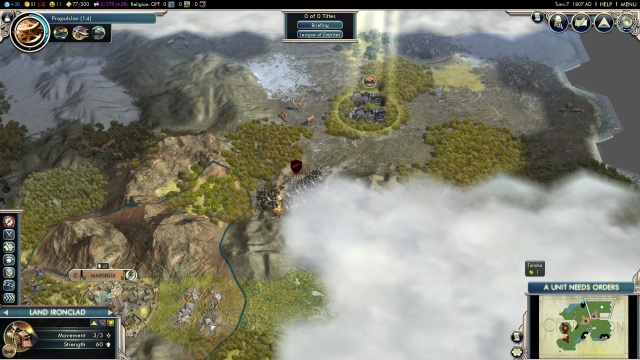
The Renaissance scenario is a historical-based game with a realistic map of the world showcasing the great split of the Christian church and the growing power of the Islamic faith and providing the backdrop for 200 turns of war. Whilst religion is undoubtedly key, war is also a necessity to gain enough victory points to win. With control of the Holy City of your religion, exploration of the New World and the crushing of armies following a different religion all vital ingredients in success, there are several ways to gain victory but detractors will, however, still note that, in the three scenarios, war is an inevitable tool of victory, but if you’re a leader who likes to use measured force to win, then you’ll certainly enjoy the new scenarios and the rules they bring.
The Fall of Rome Scenario also sees the usual rules of Civilization changed in order to accommodate the battle for Rome. With a realistic world-map based on the Roman world, and changed diplomacy in order to allow the Barbarians and two Roman legions to always be at war as well as a shorter set of win conditions, requiring you to earn the most victory points in just 70 turns, the emphasis is certainly on the expansion of your empire into your rivals’ territories. With a much shorter game-time, and more of a warmongering feel at the expense of religion and science, if you want to just aggressively expand, it’s the scenario for you.
If you were one of those aforementioned ‘peaceful’ Civilization players alienated by the fifth iteration, then I’m pleased to say that there have been several changes to accommodate you, with the emphasis on being able to work towards multiple victory conditions rather than just the one. However, for every diversification in the methods of victory, there is still an undoubted emphasis on military expansion. Whilst Espionage allows you to steal technologies in order to advance towards the technological victory condition quicker than if you fell behind, and cultural victory through the Utopia project is still achievable whilst pursuing other aims, your military might is still crucial. That’s not to say the other factors aren’t important; choosing the correct Pantheon, Religion and related boosts selected by consuming Great Prophets can affect your ability to win and grow dramatically.
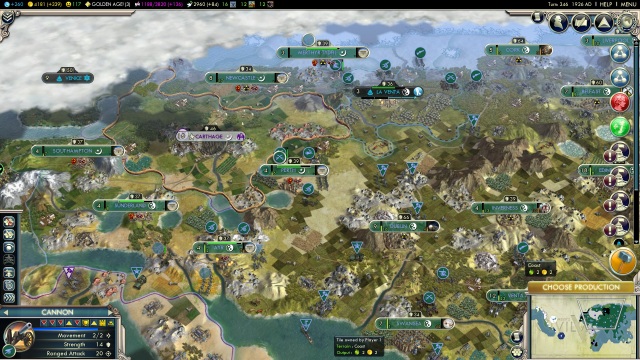
VERDICT: If you were a big fan of Civilization V, then the experience that faces you in Gods & Kings is an excellent one, with new civilizations and new scenarios providing great variety. Adding to that, the reintroduction of Religion and Espionage and you’ll soon see how those who were alienated by the warmongering feel of Civilization V will feel that there is something to bring them to try this new expansion. Although it still caters to the warmonger, the peace-keeper will now find a welcome home once more, even if the limited scope of the changes may still exclude a small minority from enjoying the game.






